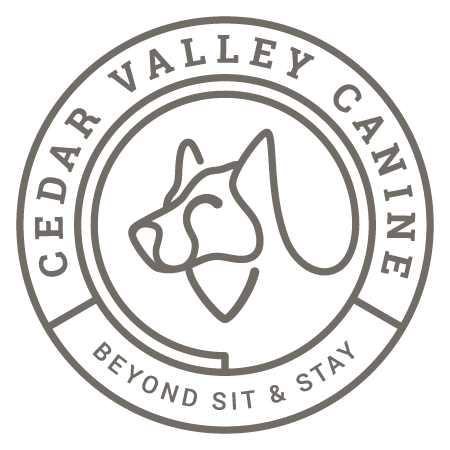Application of Pack Behavior to Pet Training and Social Interaction
Research shows that our modern day canine are all descendents of the ancient wolves or other wild dogs. The behavior and actions of today's pet dogs in their families bear many similarities to their ancestral packs.
There is a clear pack order in the wild which is established by the leadership actions and presence of the "Alpha Dog(s)" and that order is strictly maintained. Discipline and correction are meted out when necessary and in the canine world, discipline is both verbal and physical and can appear harsh, but a harmonious pack is necessary for survival in the wild. Therefore dominance is an important quality in the pack leader and is respected by other pack members.
We at Cedar Valley Canine believe that mimicking the same type of pack behavior is an important step in training your dog.
A perfect example of pack behavior. The older dog here is NOT the mother of these pups. She is actually an older cousin playing and socializing with the younger members of her pack.
At the time of weaning, mother dogs commonly growl and nip at their offspring in order to stop the nursing process. Puppies then come into their new families (human pack) with a basic understanding of correction from a dominant pack member. This understanding can easily be transferred to the human pack if done correctly. In the wild after pups are weaned, older pack members regurgitate partially digested food that the cubs can eat. In addition, they play with the young pack members and begin teaching them the work/play relationship within the group. They receive a balance of positive reinforcement - playing, licking and certain verbal cues - with the negative/correction - growling and biting and nipping.
We feel that replicating this in the home is in the best interest of the dog and the family in order to establish clear boundaries from the beginning. Being in charge of the food intake - feeding your puppy it's actual meals (not treats) from your hand coupled with play (retrieving and tug-of-war) correlates with the positive while verbal correction with the right degree of physical reinforcement correctly administered balances at the other end. Dogs are genetically predisposed to pack behavior and this is a way of training that is effective and easy for them to understand.
A puppy that recognizes and lives within the rules of it's pack is a happier puppy!

